Climate justice and digitalization. A plea to consider broader socio-economic implications of digitalization and climate change
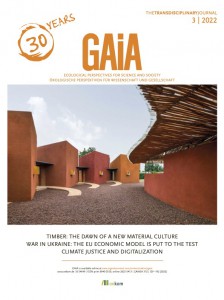 This article by Tilman Santarius in the Journal GAIA Justice and Digitalization – GAIA 2022 considers the broader socio-economic implications of digitalization on various dimensions of climate justice. Indeed, digitalization will affect the way the impacts of global warming and the co-benefits of climate protection are distributed. To advance fair benefit sharing of digital climate technologies, the decentralization of technological development must be initiated, and rules for fair competition must be established.
This article by Tilman Santarius in the Journal GAIA Justice and Digitalization – GAIA 2022 considers the broader socio-economic implications of digitalization on various dimensions of climate justice. Indeed, digitalization will affect the way the impacts of global warming and the co-benefits of climate protection are distributed. To advance fair benefit sharing of digital climate technologies, the decentralization of technological development must be initiated, and rules for fair competition must be established.
Exploring energy sufficiency: New challenges and options in times of crisis.
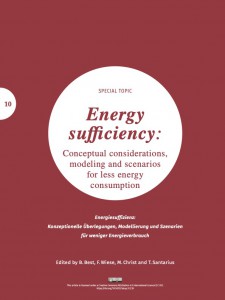 The war in Ukraine has made the fatal dependence of many countries on energy sources from non-democratic countries extremely clear. How should politics and society react to high energy prices and the necessary ban on imports of fossil fuels from Russia? Can modern societies get along with much less energy? This Op-Ed article by Benjamin Best, Michaela Christ, Tilman Santarius and Frauke Wiese Energy in the Journal for Technology Assessment in Theory and Practice argues that the concept of energy sufficiency can play an important role in answering these questions. The article explores sufficiency as a interdisciplinary research topic for energy modelling, scenarios and policy.
The war in Ukraine has made the fatal dependence of many countries on energy sources from non-democratic countries extremely clear. How should politics and society react to high energy prices and the necessary ban on imports of fossil fuels from Russia? Can modern societies get along with much less energy? This Op-Ed article by Benjamin Best, Michaela Christ, Tilman Santarius and Frauke Wiese Energy in the Journal for Technology Assessment in Theory and Practice argues that the concept of energy sufficiency can play an important role in answering these questions. The article explores sufficiency as a interdisciplinary research topic for energy modelling, scenarios and policy.
Digitalization and Energy Consumption. Does ICT Reduce Energy Demand?
 Digitalization is said to bear large potentials to reduce energy demand and greenhouse gas emissions. At the same time, criticism has been raised that digitalization may increase energy demand. Which effect will overall digitalization of the economy and society bring about? This article by Steffen Lange, Johanna Pohl and Tilman Santarius in the journal Ecological Economics combines empirical and theoretical findings from debates on decoupling energy consumption from economic growth and from debates on green IT and ICT for sustainability and finds four distinctive effects. The overall conclusion is: Digitalization will not automatically bring about reductions in energy demand and greenhouse gas emissions, but needs to be actively shaped by policies and measures in order to deliver those.
Digitalization is said to bear large potentials to reduce energy demand and greenhouse gas emissions. At the same time, criticism has been raised that digitalization may increase energy demand. Which effect will overall digitalization of the economy and society bring about? This article by Steffen Lange, Johanna Pohl and Tilman Santarius in the journal Ecological Economics combines empirical and theoretical findings from debates on decoupling energy consumption from economic growth and from debates on green IT and ICT for sustainability and finds four distinctive effects. The overall conclusion is: Digitalization will not automatically bring about reductions in energy demand and greenhouse gas emissions, but needs to be actively shaped by policies and measures in order to deliver those.
Rethinking Climate and Energy Policies.
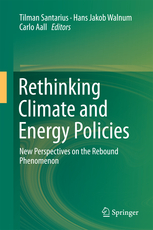 This volume, edited by Tilman Santarius, Hans Jakob Walnum and Carlo Aall, suggests rethinking current climate, energy and sustainability policy-making by presenting new insights into the rebound phenomenon. It offers new aspects in rebound economics, but then explores multidisciplinary perspectives on the phenomenon. The volume puts rebounds into praxis and presents several policy cases and sector-specific approaches, including labour markets, urban planning, tourism, information and communication technologies, and transport. It finally embeds the issue into the larger debate on decoupling, green growth and degrowth, and sketches out lessons learned for sustainable development strategies and policies at large.
This volume, edited by Tilman Santarius, Hans Jakob Walnum and Carlo Aall, suggests rethinking current climate, energy and sustainability policy-making by presenting new insights into the rebound phenomenon. It offers new aspects in rebound economics, but then explores multidisciplinary perspectives on the phenomenon. The volume puts rebounds into praxis and presents several policy cases and sector-specific approaches, including labour markets, urban planning, tourism, information and communication technologies, and transport. It finally embeds the issue into the larger debate on decoupling, green growth and degrowth, and sketches out lessons learned for sustainable development strategies and policies at large.
Energy efficiency, human behavior, and economic growth
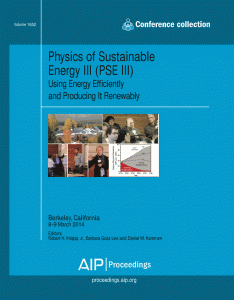 Increasing energy efficiency in households, transportation, industries, and services is an important strategy to reduce energy service demand to levels that allow the steep reduction of greenhouse gases. Yet, technological efficiency improvements may generate so-called rebound effects, which may ‘eat up’ parts of the technical savings potential. This chapter in the “Physics for Sustainable Energy II conference proceedings” provides a comprehensive review of existing research on these effects, raises critiques, and points out open questions. As a rough “rule of thumb”, about half the savings potential of energy efficiency improvements may be ‚eaten up’ by rebound effects.
Increasing energy efficiency in households, transportation, industries, and services is an important strategy to reduce energy service demand to levels that allow the steep reduction of greenhouse gases. Yet, technological efficiency improvements may generate so-called rebound effects, which may ‘eat up’ parts of the technical savings potential. This chapter in the “Physics for Sustainable Energy II conference proceedings” provides a comprehensive review of existing research on these effects, raises critiques, and points out open questions. As a rough “rule of thumb”, about half the savings potential of energy efficiency improvements may be ‚eaten up’ by rebound effects.
One Step Forward and Two Sideward.
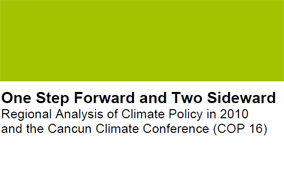 After the “failure of Copenhagen”, the UN climate conference in the following year, COP16 in Cancun 2010, has raised new hopes: the international climate diplomacy does not collapse. But the results of the conference show a mixed picture. In some areas, progress has been made, however, in other dubious compromises were found. In this climate policy analysis “One Step Forward and Two Sideward“, Tilman Santarius together with colleagues from seven other countries show what has been achieved in 2010 in the national climate policy of important key countries, and what key outcomes have been realized at the UN climate conference in Cancun.
After the “failure of Copenhagen”, the UN climate conference in the following year, COP16 in Cancun 2010, has raised new hopes: the international climate diplomacy does not collapse. But the results of the conference show a mixed picture. In some areas, progress has been made, however, in other dubious compromises were found. In this climate policy analysis “One Step Forward and Two Sideward“, Tilman Santarius together with colleagues from seven other countries show what has been achieved in 2010 in the national climate policy of important key countries, and what key outcomes have been realized at the UN climate conference in Cancun.
Failure or Opportunity?
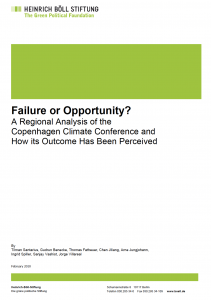 Throughout Europe, the International Climate Conference in Copenhagen (COP 15) has widely been considered a failure. However, it is unclear how this summit has been perceived in other countries: as a failure, or maybe even as an opportunity? This, it seems, heavily depends on the national perspective. For some countries, such as those of the European Union, the expectations were missed completely. In the U.S. and in Brazil, however, the outcome of the summit had been used as internal political opportunity. Click here for the paper “Failure or Opportunity”, in which Tilman Santarius together with colleagues from several other countries analyzed the results of COP15 from the perspective of central negotiating parties.
Throughout Europe, the International Climate Conference in Copenhagen (COP 15) has widely been considered a failure. However, it is unclear how this summit has been perceived in other countries: as a failure, or maybe even as an opportunity? This, it seems, heavily depends on the national perspective. For some countries, such as those of the European Union, the expectations were missed completely. In the U.S. and in Brazil, however, the outcome of the summit had been used as internal political opportunity. Click here for the paper “Failure or Opportunity”, in which Tilman Santarius together with colleagues from several other countries analyzed the results of COP15 from the perspective of central negotiating parties.
Climate and Trade – Why Climate Change Calls for Fundamental Reforms in World Trade Policy
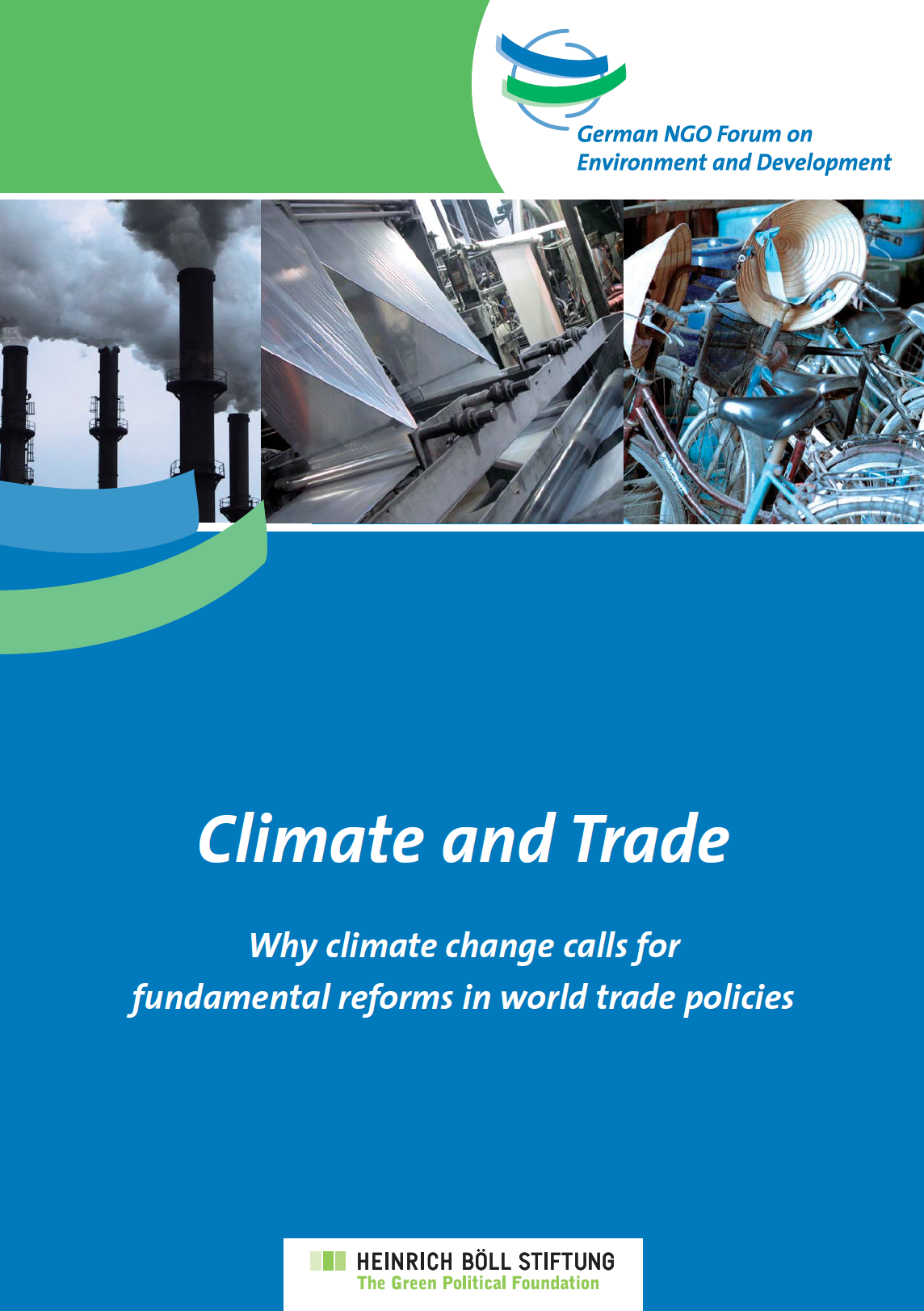 Foreign economic and trade policy are mostly designed along by the principles of free trade and export maximization. As a result, the world economy has become interconnected and more dense, and production chains span from one hemisphere to the other. Is this globalized world trade compatible with the aim to keep global warming below the dangerous threshold of 2 or even 1.5 degrees Celsius? Here is the study “Climate and Trade“, which highlights reform options for trade as well as for climate policy. In particular, it raises the issues of displacement of emissions (leakage), border adjustment measures, and technology transfer.
Foreign economic and trade policy are mostly designed along by the principles of free trade and export maximization. As a result, the world economy has become interconnected and more dense, and production chains span from one hemisphere to the other. Is this globalized world trade compatible with the aim to keep global warming below the dangerous threshold of 2 or even 1.5 degrees Celsius? Here is the study “Climate and Trade“, which highlights reform options for trade as well as for climate policy. In particular, it raises the issues of displacement of emissions (leakage), border adjustment measures, and technology transfer.
From a Marathon to a Sprint.
 Only small progress in some areas had been achieved at the UN climate conference in Poznan (COP 14). Solutions to the major conflicts remain to be developed, and answers to most crucial questions persist, such as how to define specific national reduction targets, financial sums, technological cooperation agreements, the regulations of emissions from forests, and others. If this load of decisions is not to be deferred entirely up to the ministerial conference in Copenhagen, negotiations have to move from jogging to the mode of a sprint. Here is the analysis “From a marathon to a sprint” in Environmental Finance magazine.
Only small progress in some areas had been achieved at the UN climate conference in Poznan (COP 14). Solutions to the major conflicts remain to be developed, and answers to most crucial questions persist, such as how to define specific national reduction targets, financial sums, technological cooperation agreements, the regulations of emissions from forests, and others. If this load of decisions is not to be deferred entirely up to the ministerial conference in Copenhagen, negotiations have to move from jogging to the mode of a sprint. Here is the analysis “From a marathon to a sprint” in Environmental Finance magazine.
Pit Stop Poznan.
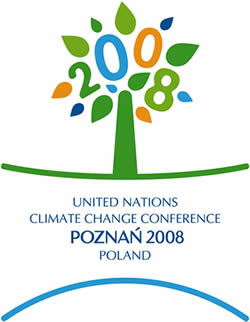 One year after the climate conference in Bali (2007), the UN climate conference in Poznan in December 2008 marked only a stopover on the way to the next major conference in Copenhagen, 2009. a new climate agreement. Politically, the conference in Poznan was overshadowed by negotiations in Brussels on a new climate and energy package of the European Union. On many points of detail, however, the climate negotiations in Poznan did move on. Therefore it is worth looking into negotiating texts and individual agreements. Click here for the analysis “Pit Stop Poznan” by Santarius Tilman and his colleagues, a shorter version of which was published in the Journal for European Environmental & Planning Law (JEEPL).
One year after the climate conference in Bali (2007), the UN climate conference in Poznan in December 2008 marked only a stopover on the way to the next major conference in Copenhagen, 2009. a new climate agreement. Politically, the conference in Poznan was overshadowed by negotiations in Brussels on a new climate and energy package of the European Union. On many points of detail, however, the climate negotiations in Poznan did move on. Therefore it is worth looking into negotiating texts and individual agreements. Click here for the analysis “Pit Stop Poznan” by Santarius Tilman and his colleagues, a shorter version of which was published in the Journal for European Environmental & Planning Law (JEEPL).
Emissions Trading and Institutional Changes in Environmental Policy-Making
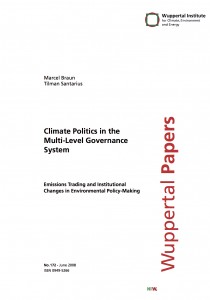 If there was a Guinness Book of Records for environmental policy, the instrument of emissions trading would certainly take a whole chapter. In less than ten years, this complex climate policy instrument has been implemented at various political levels. How did international emissions trading under the Kyoto Protocol come into being? What factors contributed to the rapid introduction of the EU Emissions Trading Scheme? Has the introduction of emissions trading brought about a transfer of power, i.e sovereignty, from national to supranational levels? Theoretically underpinned by multi-level governance theory, Tilman Santarius and Marcel Braun address these and other questions by reconstructing the invention of emissions trading in great detail in the paper “Climate Policy in the Multi-Level Governance System“.
If there was a Guinness Book of Records for environmental policy, the instrument of emissions trading would certainly take a whole chapter. In less than ten years, this complex climate policy instrument has been implemented at various political levels. How did international emissions trading under the Kyoto Protocol come into being? What factors contributed to the rapid introduction of the EU Emissions Trading Scheme? Has the introduction of emissions trading brought about a transfer of power, i.e sovereignty, from national to supranational levels? Theoretically underpinned by multi-level governance theory, Tilman Santarius and Marcel Braun address these and other questions by reconstructing the invention of emissions trading in great detail in the paper “Climate Policy in the Multi-Level Governance System“.
Developments in International and European Climate Policy in 2003
 Looking back on the international climate policy in 2003, two issues dominated the picture: one is the rather unpleasant uncertainty about the implementation of the Kyoto Protocol and the diplomatic tug of war with Russia, set by the signing of the contract in force at last. Second, the extremely positive introduction of an emissions trading scheme in the European Union. With the introduction of this world’s most progressive climate change policy, the EU could in turn bring new vitality to the international negotiations. See here a pdf of the analysis by Hermann Ott and Tilman Santarius, which has been published in the Yearbook of International Environmental Law.
Looking back on the international climate policy in 2003, two issues dominated the picture: one is the rather unpleasant uncertainty about the implementation of the Kyoto Protocol and the diplomatic tug of war with Russia, set by the signing of the contract in force at last. Second, the extremely positive introduction of an emissions trading scheme in the European Union. With the introduction of this world’s most progressive climate change policy, the EU could in turn bring new vitality to the international negotiations. See here a pdf of the analysis by Hermann Ott and Tilman Santarius, which has been published in the Yearbook of International Environmental Law.
Attitudes of German Companies towards an Emissions Trading Scheme
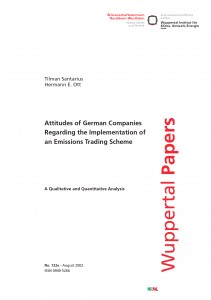 In 2001 and 2002, the introduction of the EU emissions trading scheme was in full swing.The BDI and some business organizations in Brussels and Berlin had lobbied strongly against the instrument, arguing that this would run counter to national industry interests. Yet, as this survey shows, most of the companies in Germany did not even understand the basic functioning of the instrument. However, the BDI and some business organizations in Brussels and Berlin had lobbied strongly against the instrument – apparently uninformed of the fact that German industry would include a European comparison of the winners of the EU emissions trading. Click here for a download of the study “Attitudes of German Companies Regarding the Implementation of an Emissions Trading Scheme“ by Tilman Santarius and Hermann E. Ott.
In 2001 and 2002, the introduction of the EU emissions trading scheme was in full swing.The BDI and some business organizations in Brussels and Berlin had lobbied strongly against the instrument, arguing that this would run counter to national industry interests. Yet, as this survey shows, most of the companies in Germany did not even understand the basic functioning of the instrument. However, the BDI and some business organizations in Brussels and Berlin had lobbied strongly against the instrument – apparently uninformed of the fact that German industry would include a European comparison of the winners of the EU emissions trading. Click here for a download of the study “Attitudes of German Companies Regarding the Implementation of an Emissions Trading Scheme“ by Tilman Santarius and Hermann E. Ott.
Ecological Tax Reform in Germany: Handling Two Hot Potatoes at the Same Time.
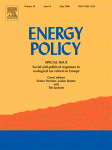 In 1999, the ecological tax reform in Germany was introduced. Its implementation was preceded by strong public discussions and political negotiations over many years. Even more interesting is the question: what happens to the ecological tax reform in the future? As this paper analysis the social acceptance of the instrument, results of interviews with policy-makers and business representatives as well as focus groups with participants from the general population suggest a couple of recommendations for reform in Germany and EU-wide. Read here the the article by Christiane Beuermann and Tilman Santarius, which has been published in the journal Energy Policy.
In 1999, the ecological tax reform in Germany was introduced. Its implementation was preceded by strong public discussions and political negotiations over many years. Even more interesting is the question: what happens to the ecological tax reform in the future? As this paper analysis the social acceptance of the instrument, results of interviews with policy-makers and business representatives as well as focus groups with participants from the general population suggest a couple of recommendations for reform in Germany and EU-wide. Read here the the article by Christiane Beuermann and Tilman Santarius, which has been published in the journal Energy Policy.